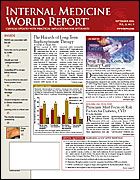Publication
Article
Internal Medicine World Report
Suspect Analgesic Rebound in Patients with Chronic Headache
Author(s):
From Headache Update 2006A Common Effect of OTC Pain Killer Overuse
ORLANDO?Close to 80% of patients presenting with chronic daily headaches may have analgesic rebound headache as a result of taking too many pain medications. "That's something we have to look at very carefully in a primary care setting," Gary E. Ruoff, MD, clinical professor of family practice at Michigan State University, East Lansing, said at Headache Update 2006, a seminar sponsored by the Rosalind Franklin University of Medicine and Science in North Chicago, Ill.
These patients often start with a primary episodic type of headache, such as migraine, tension headache, or cluster headache, which they self-treat with over-the-counter (OTC) medications?often in excessive amounts and frequently with medications that contain caffeine.
"It is important to understand that it is the frequency of the use of analgesics and not the amount of analgesics that they take that transforms these benign headaches, which are episodic, into chronic daily headaches. Too much medication, whether over-the-counter or by prescription for more than 2 days a week, can transform an episodic headache into a chronic daily headache," Dr Ruoff explained.
Patients with headaches should be asked what prescription as well as what OTC medications they are taking. Also ask about their intake of caffeinated beverages, since coffee, soda, and tea can all play a part in transforming episodic migraine, tension, or cluster headache into a chronic daily headache.
Patients may find that with prescription or OTC analgesic medications, their headaches will initially get better, but with time they have to use more of the medication and more often to keep their headaches under control. Eventually, some patients will lose ground, and their headaches will become increasingly worse because of the rebound effect of the medication.
IMWR
Dr Ruoff told ?that as these patients start taking more and more analgesic medications?sometimes ingesting hundreds of tablets each month or week?their quality of life will begin to deteriorate.
"They become irritable, and then comorbid conditions begin to creep in, such as depression, anxiety, and stress. Patients may develop fibromyalgia, myofascial pain syndrome, temporomandibular syndrome, dysmenorrhea, and irritable bowel syndrome?a whole host of comorbid factors that may go along with this," Dr Ruoff said.????????????
He went on to explain, "You don't treat headaches, you treat the migraineur, the whole person. You have to take into consideration not only the patient who has headache but also the patient who has comorbid conditions. And unless those are treated along with the headache, the migraneur may not improve."
Patients may become dependent on headache medications, especially opioids. However, Dr Ruoff has found that most headache patients who are overusing analgesics are doing so because they truly want to get rid of the pain, so as soon as the opioids can be replaced with other medications, they are happy to withdraw.
Dr Ruoff advises clinicians to take a good history from their chronic headache patients and make sure to find out what medications they are taking, not just for headache but for other pain states, that may be stimulatory and causing the headaches to transform into chronic daily headaches.
Key points
In more than three fourths of cases, chronic daily headache may represent rebound headache caused by analgesic overuse.
Ask patients what prescription and OTC drugs they are taking.
Also ask about their use of caffeinated beverages (coffee, soda, tea).
Remember that patients with chronic daily headaches may have comorbid conditions.
Don't just treat the headaches, treat the whole person.





